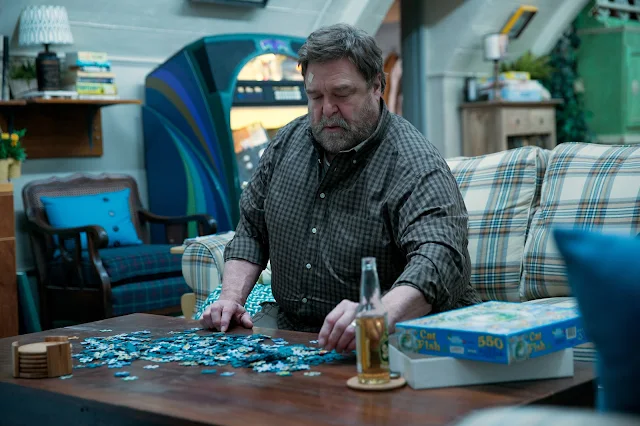In this discussion, we will delve into the specific elements that make Howard Stamble such a terrifying figure, examining key moments, psychological depth, and underlying themes that contribute to the unease he instills in viewers.

The Facade of Caring:
In the opening scenes, Howard presents himself as a caring and protective figure, providing shelter to Michelle (Mary Elizabeth Winstead) and Emmett (John Gallagher Jr.) in his underground bunker. His initial kindness and concern create a stark contrast with his later actions. For example, when Howard forces Michelle to look at a photo of a woman he claims to have saved, he simultaneously reveals his possessiveness and a disturbing sense of entitlement over those seeking refuge with him. This dichotomy adds to the psychological dissonance experienced by the characters and audiences.
The Manipulative Power Play:
As the story unfolds, Howard's true nature emerges, and he exhibits manipulative behavior to exert control over Michelle and Emmett. Howard employs fear and uncertainty to maintain dominance. One notable moment is when he reveals the earring he found in Michelle's possession, suggesting that she may have sabotaged the air filtration system, thus manipulating her emotions and making her doubt herself. Howard's insistence on maintaining a strict routine, enforcing rigid rules, and displaying an unpredictable temper generate a pervasive sense of dread and make the characters question his sanity and intentions.
Paranoia and Obsession:
Howard's psychological complexity becomes increasingly apparent as the film progresses. He displays intense paranoia and an obsession with preparation. This fixation stems from his belief that the outside world has been contaminated. Howard's obsession drives him to dangerous extremes, leading to volatile outbursts and a distorted perception of reality. A notable example is his obsession with the barrel of acid, which he uses to dissolve any potential threat. This portrayal showcases his extreme paranoia and the lengths he is willing to go to protect himself and those inside the bunker.
The Slow Unraveling:
One of the film's most effective elements is the gradual revelation of Howard's dark secrets, creating a sense of escalating tension and fear. Michelle's discovery of a woman's earring hidden behind a vent and her subsequent investigation into Howard's claims about the outside world act as catalysts for the unraveling. As Michelle uncovers clues and discovers inconsistencies, the audience shares in her growing realization that Howard may not be the savior he claims to be. The slow unraveling of Howard's true nature keeps viewers constantly questioning and engrossed in the story.
Themes of Isolation and Claustrophobia:
The setting of the underground bunker intensifies the psychological impact of Howard's character. The confined space, coupled with Howard's dominant presence, amplifies the sense of helplessness experienced by Michelle and Emmett. The claustrophobic atmosphere evokes a feeling of entrapment, mirroring the psychological state of the characters. Moments like Michelle's failed attempt to escape through the ventilation shaft, where she encounters the horrifying truth of the outside world, further emphasize the themes of isolation and claustrophobia, enhancing the overall terror of the film.
Ambiguity and Moral Ambivalence:
What makes Howard truly terrifying is the moral ambiguity surrounding his actions. Throughout the movie, it becomes increasingly difficult to discern whether Howard is genuinely concerned for their safety or if he has ulterior motives. This ambiguity is exemplified in moments such as the tense dinner scene where Howard explains his motivations and background, leaving both the characters and the audience uncertain about his true intentions. The moral ambiguity adds an extra layer of complexity to his character, leaving viewers on edge and questioning his true nature until the climactic moments of the film.
What makes Howard truly terrifying is the moral ambiguity surrounding his actions. Throughout the movie, it becomes increasingly difficult to discern whether Howard is genuinely concerned for their safety or if he has ulterior motives. This ambiguity is exemplified in moments such as the tense dinner scene where Howard explains his motivations and background, leaving both the characters and the audience uncertain about his true intentions. The moral ambiguity adds an extra layer of complexity to his character, leaving viewers on edge and questioning his true nature until the climactic moments of the film.
Perhaps he's the actual Cloverfield monster?
Conclusion: Howard Stamble in "10 Cloverfield Lane" was a bad bad man
The character of Howard Stamble in "10 Cloverfield Lane" is a testament to the power of psychological horror. John Goodman's exceptional portrayal and the meticulous screenplay combine to create a deeply unsettling and terrifying antagonist.
Conclusion: Howard Stamble in "10 Cloverfield Lane" was a bad bad man
The character of Howard Stamble in "10 Cloverfield Lane" is a testament to the power of psychological horror. John Goodman's exceptional portrayal and the meticulous screenplay combine to create a deeply unsettling and terrifying antagonist.
Through the gradual revelation of Howard's secrets, manipulative behavior, obsession, and moral ambiguity, the film showcases the disturbing depths of his character. The exploration of these elements, along with the themes of isolation and claustrophobia, delivers an intense psychological experience that lingers in the minds of viewers long after the credits roll.











